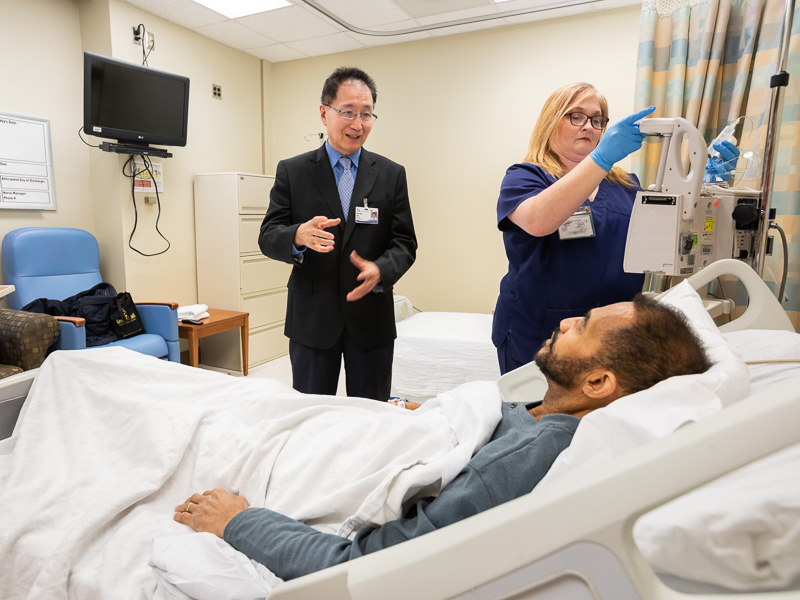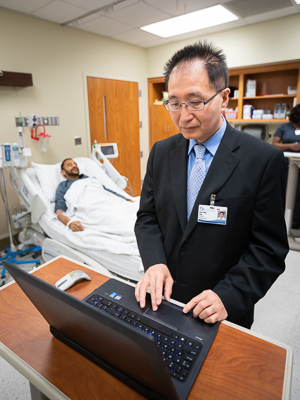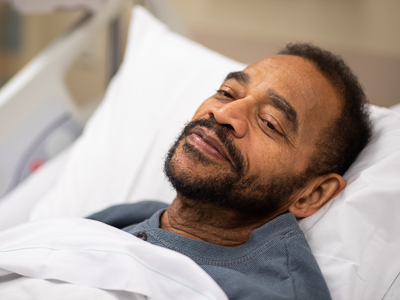Opening Phase 1 adult cancer trials offers patients more options

Opening a Phase 1 cancer clinical trial program brings the potential for new cancer therapies that may help patients who enroll and many others.
“Every new drug and treatment that we currently use and those we’ll use in the future goes through a Phase 1 trial,” said Dr. John Ruckdeschel, University of Mississippi Medical Center Cancer Institute director.
Barry Kelly of Byram, who is participating in UMMC’s first Phase 1 adult cancer trial, hopes the new immunotherapy drug will halt and eliminate a tumor that has resisted all available therapies.
“I hope it will shrink what’s there, it will help heal me and get what’s there and help my immune system fight the cancer so I can survive,” he said shortly before his second treatment.

The new drug is a novel checkpoint inhibitor targeting TIM-3. It may help patients whose tumor becomes resistant to many marketed PD-1 or PDL-1 inhibitors. The drug tells the immune system to ignore signals the tumor sends saying it’s normal and instead to recognize the tumor as a danger to the body, said Dr. Shou-Ching Tang, a physician and researcher who is the Institute’s associate director for clinical and translational research and who heads the Phase I program.
“Think of it as the tumor is putting the brakes on the immune system. Checkpoint inhibitors remove the brakes,” Tang said.
“This drug is a next-generation checkpoint inhibitor. It has the potential to be active in people whose tumor has failed with checkpoint drugs currently on the market,” Tang said. “It is designed to unleash the suppressed immune system.”
Phase 1 trials are:
- Usually small. UMMC is one of four centers nationwide to participate in this one, Tang said.
- Designed to determine the proper dose and toxicity, or side effects of the drug, after drugs have shown potential in animal testing.
This trial is unique in that it is not organ specific. It is designed for patients with solid tumors and covers multiple types of cancers. Patients with any solid tumor for whom standard therapy hasn’t worked may be eligible. Cancers for which this trial may be appropriate include cervical, gastric, esophageal, colorectal, hepatocellular, melanoma, Merkel cell carcinoma, mesothelioma, small cell and non-small cell lung cancer, ovarian, squamous cell carcinoma of the head and neck, renal cell carcinoma, urothelial carcinoma, pancreatic cancer and possibly others.
Patients must meet specific requirements to participate in a Phase 1 trial and those who are interested are evaluated to make sure they qualify for the trial. Most enter a Phase 1 trial in hopes the new therapy will help them and provide information for other patients who may follow.
Patients, even those with the same cancer, may have different outcomes and experiences in a clinical trial. UMMC physicians discuss the possible benefits and risks of each trial before a patient enrolls.
“When a patient fails standard therapy, they don’t have other options,” Tang said. “Patients generally are enthusiastic that it may benefit them and for the opportunity to help others.”
Physicians also favor having Phase 1 trials. As a practicing oncologist, Tang said, “It’s very hard to tell a patient that this is it. This gives physicians more to offer their patients.”
UMMC is uniquely qualified to offer the Phase 1 program, Tang said. Phase 1 trials should be offered at an academic medical center where a high-level medical and research infrastructure is available to support them.
“As the state’s only academic medical center it is incumbent upon us to provide access to these studies to patients in the Jackson metro and those throughout the state,” Ruckdeschel said.
“Studies give patients and their families hope that they will receive a newly effective drug long before it is commercially available,” he said. “Even if the drug is not effective for them, the cancer patient knows they have been part of a process of developing a new drug. It gives added purpose to their lives.”
Tang was recruited to help start the Phase 1 program, Ruckdeschel said. “He is an internationally recognized translational researcher who we are fortunate to have to head our translational research and Phase 1 program.”

Kelly said Ruckdeschel, his medical oncologist, referred him to Tang after his tumor grew while he was on standard therapy.
He believes his cancer started about three years ago when he had a cough that wouldn’t stop. After about a year, he went to an ENT specialist who examined him and prescribed medication for acid reflux. It helped the cough.
A year later, with stomach problems he thought were related to a diabetes medication, Kelly had an endoscopy and doctors found a Stage 3 lower esophageal cancer.
“I was referred to UMMC for surgery with Dr. (Jacob) Moreman,” Kelly said.
After having his lower esophagus and part of his stomach removed, Kelly said, “I had a 50/50 survival chance.”
“I had more chemo and immunotherapy and it didn’t help,” he said. “My tumor grew some.”
Kelly, his wife Catherine, and daughter, now are waiting for he results as this grandfather of three spends more time with his family and resumes work.
He encourages others to seek a second opinion and to take preventative steps so they don’t get cancer, such as watching their diet and heeding screening recommendations.
“My only symptom was acid reflux and later a cough. I suggest a second opinion and talking to others about what you should do,” he said.
Tang hopes the program grows to offer options to more cancer patients as UMMC completes its 17-bed Clinical Trials Unit on the top floor of University Hospital. A second Phase 1 cancer trial is completing review by the UMMC Institutional Review Board, a group that reviews investigational drugs and the way they are offered to patients.
More about Phase 1 trials:
- New drugs must be tested in the lab and in animals before they can be offered to humans. The initial studies in humans are small Phase 1 trials to assess safety and whether the drug is acting in the way it is proposed to.
- Succeeding phases, 2-4, usually are larger and each has a slightly different focus. Phase 2 trials usually study how well the drug performs in a particular cancer or cancers. Phase 3 trials usually compare the experimental therapy to standard therapy. Phase 4 trials usually provide further effectiveness data as well as look for chronic side effects with longer term dosage and follow up by continuing reviews of safety, risks, benefits and side effects. Whatever the phase, all trials are designed to assess patient safety and tolerance.
- Institutional Review Boards oversee clinical trials by:
- Confirming the objectives and overall plan of the study
- Confirming the adequacy of the plans to monitor the patient for safety
- Assuring that the study will be of a sufficient size to answer the proposed question
- Overseeing the reporting and management of side effects
Some studies, such as the current trial, have specific requirements that apply to every site offering the trial. Those standards can involve testing beyond the normal standard of care. In this case, the drug company pays for the medication and trial costs that can include physician and nursing time, imaging scans, other medications and tools needed to administer the drug.
Find more about UMMC Cancer Institute clinical trials, click here.


